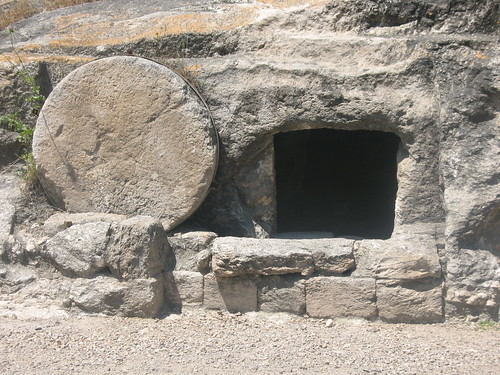We run our website the way we wished the whole internet worked: we provide high quality original content with no ads. We are funded solely by your direct support. Please consider supporting this project.
8 Arguments for the Reality of the Resurrection
James Emery via Compfight
As we come up on Easter many ask questions about the reliability of the resurrection story. Was it a legend? Did the early church fabricate it? Can we trust what we read in the Bible and what we hear preached?
Greg has written extensively on this topic. In his best-selling book Letters from a Skeptic, Greg responds to these questions:
____________________________________________
- The resurrection event is testified to by five independent sources (Matthew, Mark, Luke, John, and Paul — who referred to the numerous other sources as well, such as Peter and James and first Corinthians 15). …
- The location of Jesus’s tomb was well-known by all, so if Jesus had not risen from the dead, if his body were yet in the tomb, this could have been easily checked out. But Jesus’ followers (who would suffer persecution for their faith) and the opponents of Jesus (who would want to falsify the Christian claim) would have a motive for checking this out. But all agree, the tomb was empty. How is this agreement to be explained?
- Related to #2, no one disputes that the Christian church began in Jerusalem just a few weeks after Jesus’ crucifixion. It exploded in growth. And the content of the message that causes this explosion was that Jesus was the Messiah, the Lord of all, as was evidenced by his miracles and resurrection from the dead (see Acts 2:22–24). They do not present to their audience some unknown figure in the distant past. They’re talking about one of their audience’s contemporaries! How is this growth to be explained?
- The resurrection narratives lack the characteristics common to late legendary narratives, and embody many of the characteristics common to early eyewitness based reports. There is, for example, much detail, much of it being irrelevant to the storyline. To give one illustration, Mark mentions the name of the well-known member of the Sanhedrin (a Jewish councilman) who donated his tomb for Jesus — Joseph of Arimathea. Now if one is going to fabricate an account, one doesn’t create this sort of detail. One certainly doesn’t drop names of such prominent people, people who can easily be cross examined. …
- The conversion of Paul is unexplainable except on the basis he himself gives: he confronted the risen Lord (see Acts 9 and 1 Corinthians 15). Here was a man dead set against Christianity, even overseeing the stoning of one of its preachers, and then one moment he’s converted. Similarly, James, the brother of Jesus, was also a nonbeliever in Jesus until the Lord appeared to him (1 Corinthians 15:7). …
- Paul gives us an early list of the Resurrection appearances. It’s found in 1 Corinthians 15, written about 15 to 20 years after the resurrection. He is here attempting to convince some Corinthians that the resurrection of Jesus did in fact occur, and to do this he lists Christ’s appearances to the apostles, and to James, and “to more than 500 at the same time, most of whom are still living” (1 Corinthians 15:6). The thrust of noting the larger number of living people who saw Christ resurrected is to say, “If you don’t believe me, the evidence is still around. Go and ask those who saw it.” By the standard of any law court, this must be taken as strong evidence.
- There’s no way of accounting for the transformation of the disciples except on the basis of the resurrection, the very basis they themselves give. If you compare the disciples before the death of Jesus with the disciples after the resurrection appearances, you will see a world of difference. One day they are fearful and hiding; the next day they are facing hostile audiences, preaching the resurrection.
- Finally, there is no motive for the disciples to fabricate the story. They had nothing to gain and everything to lose. Nor is there anything to lead us to believe that they were disposed to fabricate such a story, or had the sort of characters which would be capable of such an incredible fabrication. Nor is there anything to suggest that they could have successfully pulled such an incredible fabrication off, even if they had wanted to.
In short, the denial of the resurrection has nothing to recommend itself as a historical hypothesis, while the admittance of the resurrection has everything to recommend itself as a historical hypothesis. (127-130)
Category: General
Tags: Apologetics, Easter, Letters from a Skeptic, Resurrection
Topics: Apologetics
Related Reading

The Cross Reveals God’s Love
The central way Christ functions as the perfect image and exact representation of God is by dying on the cross. While Christ’s entire life manifests the true God, Christ came primarily to die. It was his death that defeated the devil and freed us from bondage. The one who does what is sinful is of…

Podcast: What Did Jesus Say and Do During the 40 Days After His Resurrection?
Greg talks about Jesus’ strange post-resurrection life. http://traffic.libsyn.com/askgregboyd/Episode_0439.mp3

The Hope of the Cross & Resurrection
In a real sense, God has already “raised us up with Christ and seated us with him in the heavenly realms” (Eph 2:6). And while “we do not see everything subject to [us],” the truth of the matter is that, in Christ, we have already been restored to our rightful place as co-rulers with Christ.…

How Reliable were the Early Church’s Oral Traditions?
How reliable were the early church’s oral traditions? In terms of assessing the reliability of the Gospels, this is an extremely important question. First century Jewish culture was what scholars today would call an “orally dominated culture.” While a certain percentage of people could read and write (see below), information was for the most part…

What About the Contradictions Found in the Gospels?
It’s quite common for people to question the veracity of the Gospels because there are contradictions between them. In fact, an interaction between Steven Colbert and Bart Erhman, a scholar who makes a big deal of these contradictions, has become quite popular. While Colbert’s comedic response is entertaining, we must say more. And Greg has done…


